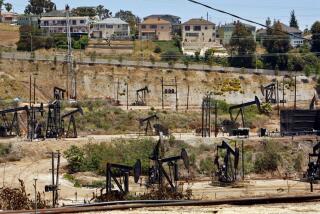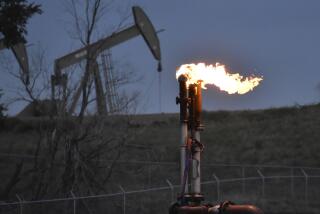Watchdog group faults states’ inspections of oil, gas wells
- Share via
WASHINGTON -- State regulators inspect oil and gas wells sporadically, do not consistently record violations, and impose light penalties on companies that are found to break environmental, health or safety rules, according to a new research report issued by the environmental watchdog group Earthworks.
The report, “Breaking All the Rules,” comes out at a time when hydraulic fracturing -- known as “fracking” -- and horizontal drilling have touched off a nationwide boom in oil and gas production. While the growth in domestic energy production has nudged the United States closer to energy self-sufficiency and created jobs, it has also raised questions about the adequacy of environmental and health safeguards and elicited pushback from localities that contend that their states are not doing enough to protect them.
Earthworks monitors natural resource development. Its funders include the Heinz Endowments, the Park Foundation and the New York Community Trust.
The Marcellus Shale Coalition, a consortium of companies active in oil and gas production in the Northeast, assailed the report.
“In 2009, Marcellus Shale producers supported a well permitting fee increase which helped double the Pennsylvania Department of Environmental Protection’s regulatory staff at no taxpayer expense,” said Patrick Creighton, a spokesman for the coalition. “It’s not surprising, however, that this intellectually dishonest, Heinz Endowments-backed organization would make such provably false claims, contrary to the facts and readily available data, in an effort to grab a headline and spread fear.”
States lack the inspectors and equipment they need to inspect wells annually, according to the report, which is based on data collected from regulatory agencies in Colorado, New Mexico, New York, Ohio, Pennsylvania and Texas. In 2010, for example, Pennsylvania inspectors were unable to perform onsite inspections of 82,000 active oil and gas wells, or 91% of those in the state. Yet the state’s guidelines recommend five inspections annually per well.
The backlog stems in part from the relatively small number of inspectors states have to monitor the expansion of oil and gas production. In Colorado, 15 inspectors conducted reviews of 16,228 wells in 2010, or 1,082 inspections per employee. In New Mexico, 12 inspectors averaged 1,732 inspections each, or 20,780 total.
Violations are tracked poorly across the board, according to the report. In Colorado and New Mexico, information about violations is publicly available on a well-by-well basis but not for the state overall. Inspectors in those states also have wide latitude to determine what is a violation. In Colorado, for example, even if an inspection is marked “unsatisfactory,” it might not yield violations. In Texas, regulators in 2010 gave enforcement referrals “recommendations to enforce, not actual enforcement actions,” the report said.
But Texas broadly defended its record of oversight of the oil and gas industry. “For almost 100 years, the Railroad Commission of Texas has been effectively regulating the oil and gas industry,” the commission said in a statement.
The commissioners said that in fiscal year 2012, inspectors conducted 118,484 lease inspections and identified 55,960 alleged violations. “Faced with a shutdown of an oil, gas or injection well and/or financial penalties, the overwhelming majority of operators bring their leases into compliance,” the Texas regulator said.
Even when violations are recorded on the state level, disciplinary action is often deferred, the report found. Financial penalties are frequently paltry, including for repeat offenders.
ALSO:
Woman arrested with family dog and 3 kids in trunk
Dyrk Burcie, 4, and with cancer, became firefighters’ hero
National Voter Registration Day: This campaign is about voters
neela.banerjee@latimes.com
More to Read
Sign up for Essential California
The most important California stories and recommendations in your inbox every morning.
You may occasionally receive promotional content from the Los Angeles Times.











